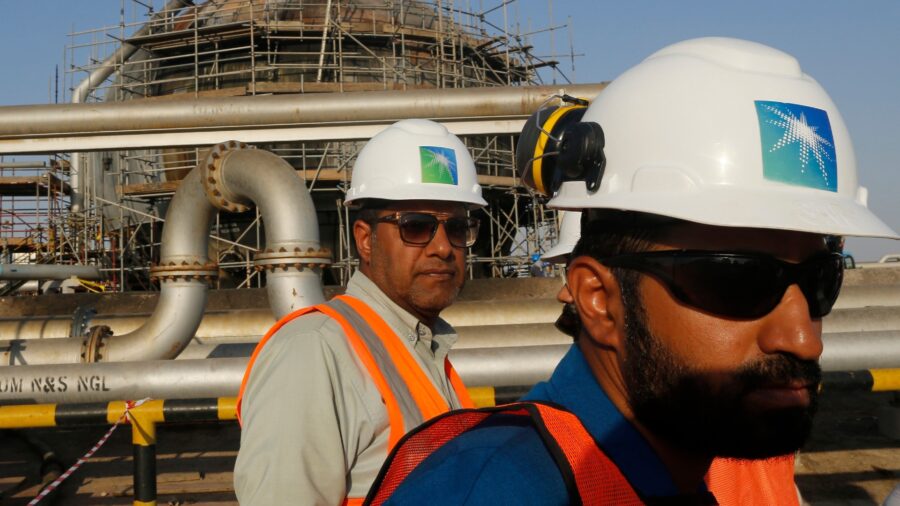DUBAI, United Arab Emirates—Saudi Arabia’s state-backed oil giant Aramco announced Sunday that its profits nearly halved in 2020 to $49 billion, a big drop that came as the coronavirus pandemic roiled global energy markets.
Saudi Arabian Oil Co. released its annual financial results a year after the pandemic sent the price of oil crashing to all-time lows as people stopped moving around the world to stem the spread of the virus. In recent weeks, however, the price has edged up as movement restrictions ease, commerce increases and more people get vaccinated against COVID-19. Still, analysts caution that a peak in demand may still be far off.
Despite the 44 percent drop in net income, Aramco said it would stick to its promise of paying quarterly dividends of $18.75 billion—$75 billion a year—due to commitments the company made to shareholders in the run-up to its initial public offering. Nearly all of the dividend money goes to the Saudi government, which owns more than 98 percent of the company. Aramco’s policy to pay dividends significantly higher than its 2020 free cash flow of $49 billion stands in sharp contrast to other oil giants that have cut payouts. Seeking a cash infusion to pay the billions of dollars in the face of dwindling revenue, Aramco recently has issued international bonds.
Saudi Aramco profit of $49 billion in 2020 is down from $88.2 billion in 2019 and $111.1 billion in 2018. Still, Aramco remains one of the world’s most valuable companies.
“In one of the most challenging years in recent history, Aramco demonstrated its unique value proposition through its considerable financial and operational agility,” President and CEO Amin H. Nasser said in a statement. “As a result, our financial position remained robust.”
The company produced the equivalent of 9.2 million barrels per day of crude oil over the course of the year, its annual results said. Capital expenditure was down in 2020 to $27 billion compared to $32.8 billion the year before. Aramco expects to spend $35 billion this year, some $5-10 billion lower than previous estimates.
Aramco facilities have come under increasing attack as Yemen’s Iran-backed Houthi rebels across the southern border target the kingdom’s oil refineries and export terminals. In an interview with Saudi-owned al-Arabiya TV on Sunday, Nasser said an Aramco facility in the capital of Riyadh struck by drones days before “has started to return to service,” adding that the company “has contingency plans to deal with any assault.”

In recent months, oil prices have made a major comeback from April 2020, when the price of international benchmark Brent crude dipped below $20 a barrel. For the first time in a year, the price of Brent surpassed $60 a barrel last month and traded over $64 a barrel Sunday.
The price increase has come as Saudi Arabia seems determined to curb output and support crude markets even as demand rises, with nations lifting lockdowns and accelerating vaccination campaigns.
Nasser struck an optimistic note about the year ahead, saying that Aramco is “seeing a pick-up in demand in Asia and also positive signs elsewhere.”
“We remain confident that we will emerge on the other side of this pandemic in a position of strength,” he added.
Earlier this month, the kingdom said it would extend its voluntary production cut of 1 million barrels a day through to April. Most OPEC oil cartel and allied countries likewise left their production cuts in place—in stark contrast to March of last year when a price war between Saudi Arabia and Russia prompted the two oil giants to unleash an onslaught of crude on the market as demand dipped. Saudi officials have urged caution, arguing that global economic recovery may still be undermined by new virus restrictions and fast-spreading virus variants.
Before December of 2019, when Aramco floated 1.5 percent of its shares on the stock exchange, the firm was owned directly by the Al Saud ruling family and didn’t need to announce results. Initially, Aramco listed at 32 riyals ($8.53) a share, becoming the world’s most valuable listed company, with a market valuation of $1.7 trillion. Since then, however, Aramco lost its stock exchange crown to Apple as its value declined. On Sunday it traded around 35 riyals ($9.30) a share.
By Isabel Debre


